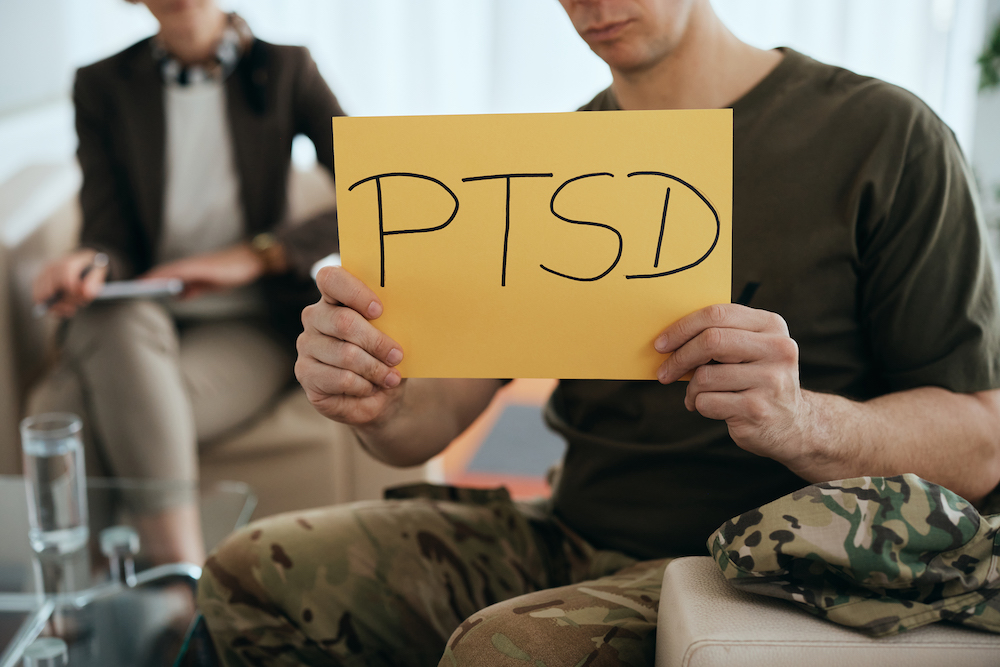In recent years, the conversation around Post-Traumatic Stress Disorder (PTSD) and its treatment options has evolved, introducing new possibilities and hope for those affected. At Royal Care Plus, a leading medical cannabis clinic in Tampa Bay, Florida, we’re at the forefront of exploring these new avenues. Our focus today is on the potential health benefits of medical cannabis for individuals struggling with PTSD. This exploration is guided not only by anecdotal evidence but also by emerging scientific research that seeks to understand the role of cannabis in managing PTSD symptoms.
As we embark on this journey, it’s crucial to remember that PTSD is a complex condition, and its treatment varies from individual to individual. Cannabis, with its diverse active compounds and unique interaction with the human body, presents an interesting option for many. Through this blog post, we aim to unpack the intricacies of cannabis use in PTSD treatment, backed by the latest findings and insights from experts in the field.
At Royal Care Plus, we’re committed to providing our community with well-researched, accurate information that empowers individuals to make informed decisions about their health. Let’s delve into the world of medical cannabis and PTSD, exploring how this natural remedy might offer a ray of hope to those in need.

The Complexity of Post-Traumatic Stress Disorder
Post-Traumatic Stress Disorder (PTSD) is not just a condition; it’s a multifaceted challenge that affects individuals in deeply personal ways. Originating from experiencing or witnessing traumatic events such as military combat, natural disasters, serious accidents, or violent personal assaults, PTSD transcends the boundaries of a typical stress response. It is characterized by a spectrum of symptoms that include recurring flashbacks, heightened anxiety, mood swings, and an overwhelming sense of fear or sadness. These symptoms can be persistent and severe, disrupting daily life and making it difficult for sufferers to maintain relationships, employment, or a sense of normalcy.
The uniqueness of PTSD lies in its individual impact. What triggers PTSD in one person may differ vastly from another. This variability extends to the symptoms and their intensity. Some individuals might experience severe anxiety and insomnia, while others might struggle with emotional numbness or avoidance behaviors. This personal variance underscores the necessity for tailored approaches in understanding and treating PTSD. Recognizing that each person’s journey with PTSD is distinct is pivotal in offering effective support and treatment options. It’s not just about managing symptoms; it’s about understanding the person behind them and their specific experiences and challenges.
Cannabis and PTSD: The Connection & Active Compounds in Cannabis Beneficial for PTSD
The conversation around using cannabis as a potential treatment for PTSD has been gaining momentum. Amidst this evolving narrative, cannabis has been viewed as a beacon of hope for many suffering from the disorder. Researchers have turned their focus towards understanding how the active compounds in cannabis might interact with the brain’s chemistry, particularly in individuals grappling with PTSD. The impetus behind this research is the anecdotal evidence from many PTSD sufferers who report symptomatic relief after using cannabis. This has sparked a growing interest in scientifically decoding the relationship between cannabis and PTSD management.

Scientific Insights into Cannabis and PTSD
Recent studies have started to shed light on the complex relationship between cannabis use and PTSD symptom management. For instance, research suggests that certain cannabinoids, the active components in cannabis, might play a role in stabilizing mood and alleviating anxiety, which are key issues for individuals with PTSD. However, it’s important to note that the scientific community has yet to reach a consensus on the efficacy of cannabis as a standalone treatment for PTSD. Studies often yield mixed results, with some indicating short-term symptom relief, while others caution about potential long-term adverse effects. This dichotomy underscores the need for further research to understand the nuanced roles of cannabis in treating PTSD.
The Role of THC, CBD, and the Endocannabinoid System
Delving deeper, the primary compounds in cannabis – THC (tetrahydrocannabinol) and CBD (cannabidiol) – have attracted significant attention. THC is known for its psychoactive properties, while CBD is non-psychoactive and has been linked to providing relief from anxiety and stress. These compounds interact with the body’s endocannabinoid system, a complex network that plays a key role in regulating mood, memory, and stress response. This interaction is believed to be pivotal in how cannabis might exert its effects on PTSD symptoms. For example, THC’s interaction with the brain’s cannabinoid receptors could potentially ease the intensity of flashbacks and nightmares, common PTSD symptoms. CBD, on the other hand, might help in moderating anxiety and improving sleep quality without the psychoactive effects associated with THC. The synergy between these compounds, along with other cannabinoids and terpenes in cannabis, could offer a holistic approach to managing PTSD symptoms, though more research is essential to fully understand and harness these interactions.
The Potential Benefits of Cannabis for PTSD
A crucial aspect of understanding cannabis’s potential in treating PTSD lies in examining the evidence from various studies. Some research highlights cannabis’s ability to offer short-term relief for a range of PTSD symptoms. For example, a study published in the “Journal of Psychopharmacology” found that patients with PTSD experienced a significant reduction in the severity and frequency of nightmares after using cannabis. Another study, focusing on the broader scope of symptoms such as anxiety and sleep disturbances, reported similar findings, with participants noting a marked improvement in sleep quality and a decrease in anxiety levels. These studies provide valuable insights, suggesting that cannabis could be a beneficial tool in managing acute PTSD symptoms.
The efficacy of cannabis in alleviating PTSD symptoms may also be influenced by specific strains and terpenes. Different strains of cannabis, due to their unique compositions of cannabinoids and terpenes, can produce varying effects. For instance, a strain with a higher CBD to THC ratio might be more suitable for managing anxiety without inducing significant psychoactive effects. On the other hand, strains with a balance of both THC and CBD might be more effective in addressing nightmares and sleep disturbances. Terpenes, the aromatic compounds in cannabis, also play a role in enhancing these effects. For example, the terpene myrcene, commonly found in many cannabis strains, is known for its sedative properties, which can be beneficial in improving sleep quality.
Personal anecdotes and case studies often provide a more relatable perspective on the benefits of cannabis for PTSD. Many users report a noticeable improvement in their quality of life after incorporating cannabis into their treatment plan. For example, a case study published in a medical journal described how a veteran with severe PTSD found significant relief from his symptoms after using medical cannabis, particularly noting improvements in managing anxiety, flashbacks, and sleep disturbances. These personal accounts, while anecdotal, add a valuable dimension to the understanding of cannabis’s potential benefits for PTSD, echoing the findings of formal studies and highlighting the individual nature of treatment effectiveness.
Understanding the Potential Risks of Cannabis Use
While cannabis shows promise in the treatment of PTSD, it is essential to approach its use with a balanced understanding of potential risks. One such concern is the risk of dependency. Though cannabis is often considered less addictive compared to other substances, the possibility of psychological dependency, particularly in individuals with mental health conditions like PTSD, cannot be overlooked. It’s crucial for patients and healthcare providers to monitor usage patterns and ensure that cannabis is used as a therapeutic tool rather than a dependency-enabling substance. Additionally, the psychoactive effects of THC can sometimes exacerbate symptoms in certain individuals, underscoring the need for careful strain selection and dosing.
Given these considerations, the role of medical supervision becomes paramount. It is critical for patients exploring cannabis for PTSD treatment to do so under the guidance of a knowledgeable healthcare provider. This ensures that treatment plans are personalized, taking into account the patient’s unique symptoms, medical history, and any concurrent treatments. Medical professionals can provide valuable insights into the most appropriate strains, dosages, and forms of cannabis, helping to mitigate potential risks while maximizing therapeutic benefits. In this context, personalized treatment is not a one-size-fits-all approach but a tailored strategy to ensure patient safety and efficacy.
Ongoing Research and Future Directions
The exploration of cannabis as a treatment for PTSD is an evolving area of research. There is a growing consensus among the scientific community about the need for more rigorous, controlled clinical trials. These studies are crucial in validating the therapeutic potential of cannabis, helping to establish more concrete guidelines for its use in PTSD treatment. Rigorous research will also help in understanding the long-term effects of cannabis use in PTSD patients, providing a clearer picture of its role in sustained symptom management and overall mental health.
Looking forward, the scientific community is poised for several exciting research initiatives. Upcoming studies are expected to delve deeper into the nuances of how different cannabinoids and terpenes interact with the endocannabinoid system in the context of PTSD. There’s also a growing interest in understanding how factors like genetics, lifestyle, and the nature of the trauma impact the efficacy of cannabis treatment. These future directions not only signify a commitment to exploring the potential of cannabis in mental health care but also represent a broader shift towards more personalized and nuanced approaches in medical treatment. As these studies unfold, they promise to shed more light on the intricate relationship between cannabis and PTSD, potentially paving the way for more effective and targeted therapies.

Taking the Next Steps with Royal Care Plus
Embarking on a journey to manage PTSD symptoms is a significant step toward healing and well-being. If this article has sparked your interest in the potential of cannabis as a therapeutic option, we invite you to explore this path further with the guidance and support of the professionals at Royal Care Plus.
Our team of experts is well-versed in the intricacies of cannabis-based treatments and is committed to providing you with comprehensive care. At Royal Care Plus, we believe that every individual’s experience with PTSD is unique, and so should be their treatment. We’re here to offer personalized consultations, helping you understand how cannabis can be integrated into your therapy in a safe and effective manner. Whether you are just beginning to consider cannabis as a treatment option or are seeking more advanced guidance, our team is here to support you every step of the way. We encourage you to reach out to us, ask questions, and make informed decisions about your health.
Remember, the journey to recovery is not one you have to walk alone. With the right support and knowledge, you can navigate this path with confidence and clarity. Let Royal Care Plus be a part of your support system. Schedule your medical consultation with us today, and together, we will chart a course that prioritizes your well-being, equipping you with the knowledge and support necessary to make informed decisions about your health.
Healthcare Disclaimer:The information on this website is for educational and informational purposes only and is not intended to be a substitute for professional medical advice, diagnosis, or treatment. Always seek the advice of your doctor or other qualified healthcare provider with any questions regarding a medical condition. Never disregard professional medical advice or delay in seeking it because of something you have read on this website. By using this website, you agree to the terms of this disclaimer.

